E-Word of Mouth Marketing and Goa's Hotel Industry
VerifiedAdded on 2022/08/31
|63
|20069
|19
Report
AI Summary
This research report investigates the influence of E-word of mouth (E-WOM) marketing on the hospitality industry, specifically focusing on hotels in Goa. The study explores how online reviews and social media impact consumer behavior and hotel operations. Data was collected through questionnaires administered to both hotel guests and managers to understand the effects of positive and negative reviews on decision-making processes. The report highlights the growing significance of E-WOM in the digital age and its role in shaping consumer choices, emphasizing the importance of understanding and managing online reputation within the hotel sector. The findings reveal that E-WOM has a significant impact on the hospitality industry in Goa, as customers increasingly rely on online reviews. The research also provides insights into how hotel managers perceive and utilize online feedback to improve customer satisfaction and address service shortcomings, highlighting the competitive pressures that E-WOM imposes on the industry. The study also includes a review of relevant literature, objectives, methodology, research questions, findings, and conclusions.
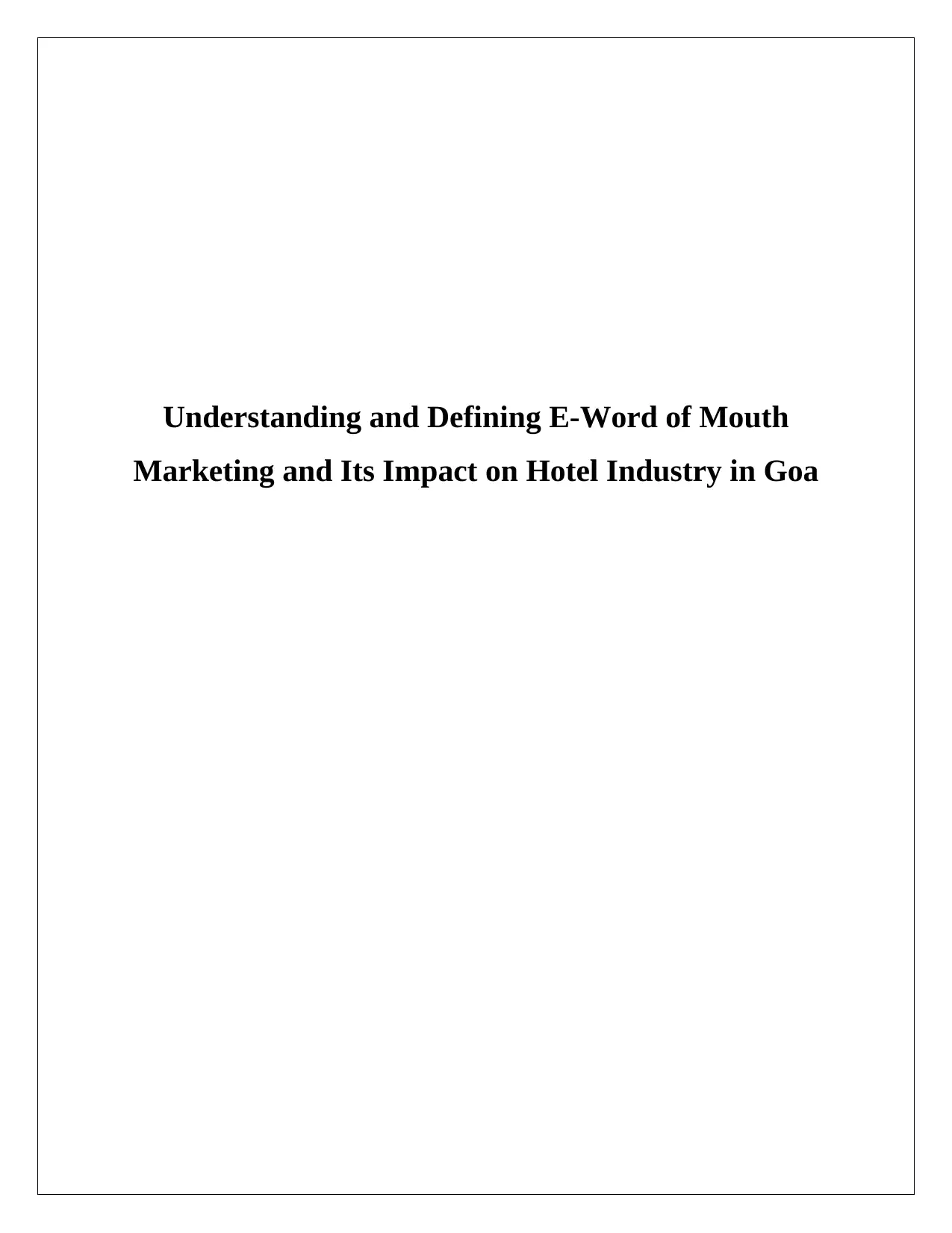
Understanding and Defining E-Word of Mouth
Marketing and Its Impact on Hotel Industry in Goa
Marketing and Its Impact on Hotel Industry in Goa
Paraphrase This Document
Need a fresh take? Get an instant paraphrase of this document with our AI Paraphraser
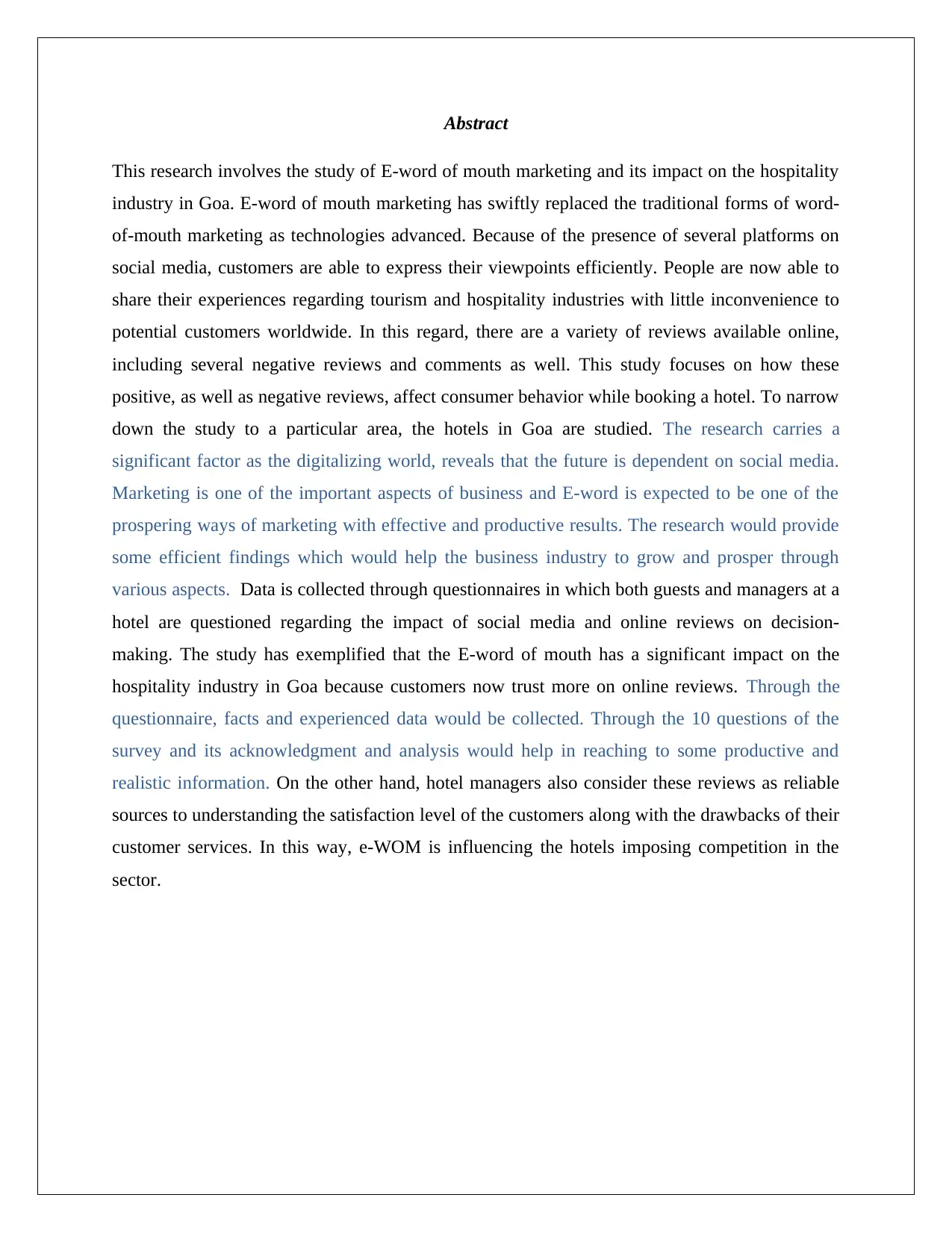
Abstract
This research involves the study of E-word of mouth marketing and its impact on the hospitality
industry in Goa. E-word of mouth marketing has swiftly replaced the traditional forms of word-
of-mouth marketing as technologies advanced. Because of the presence of several platforms on
social media, customers are able to express their viewpoints efficiently. People are now able to
share their experiences regarding tourism and hospitality industries with little inconvenience to
potential customers worldwide. In this regard, there are a variety of reviews available online,
including several negative reviews and comments as well. This study focuses on how these
positive, as well as negative reviews, affect consumer behavior while booking a hotel. To narrow
down the study to a particular area, the hotels in Goa are studied. The research carries a
significant factor as the digitalizing world, reveals that the future is dependent on social media.
Marketing is one of the important aspects of business and E-word is expected to be one of the
prospering ways of marketing with effective and productive results. The research would provide
some efficient findings which would help the business industry to grow and prosper through
various aspects. Data is collected through questionnaires in which both guests and managers at a
hotel are questioned regarding the impact of social media and online reviews on decision-
making. The study has exemplified that the E-word of mouth has a significant impact on the
hospitality industry in Goa because customers now trust more on online reviews. Through the
questionnaire, facts and experienced data would be collected. Through the 10 questions of the
survey and its acknowledgment and analysis would help in reaching to some productive and
realistic information. On the other hand, hotel managers also consider these reviews as reliable
sources to understanding the satisfaction level of the customers along with the drawbacks of their
customer services. In this way, e-WOM is influencing the hotels imposing competition in the
sector.
This research involves the study of E-word of mouth marketing and its impact on the hospitality
industry in Goa. E-word of mouth marketing has swiftly replaced the traditional forms of word-
of-mouth marketing as technologies advanced. Because of the presence of several platforms on
social media, customers are able to express their viewpoints efficiently. People are now able to
share their experiences regarding tourism and hospitality industries with little inconvenience to
potential customers worldwide. In this regard, there are a variety of reviews available online,
including several negative reviews and comments as well. This study focuses on how these
positive, as well as negative reviews, affect consumer behavior while booking a hotel. To narrow
down the study to a particular area, the hotels in Goa are studied. The research carries a
significant factor as the digitalizing world, reveals that the future is dependent on social media.
Marketing is one of the important aspects of business and E-word is expected to be one of the
prospering ways of marketing with effective and productive results. The research would provide
some efficient findings which would help the business industry to grow and prosper through
various aspects. Data is collected through questionnaires in which both guests and managers at a
hotel are questioned regarding the impact of social media and online reviews on decision-
making. The study has exemplified that the E-word of mouth has a significant impact on the
hospitality industry in Goa because customers now trust more on online reviews. Through the
questionnaire, facts and experienced data would be collected. Through the 10 questions of the
survey and its acknowledgment and analysis would help in reaching to some productive and
realistic information. On the other hand, hotel managers also consider these reviews as reliable
sources to understanding the satisfaction level of the customers along with the drawbacks of their
customer services. In this way, e-WOM is influencing the hotels imposing competition in the
sector.
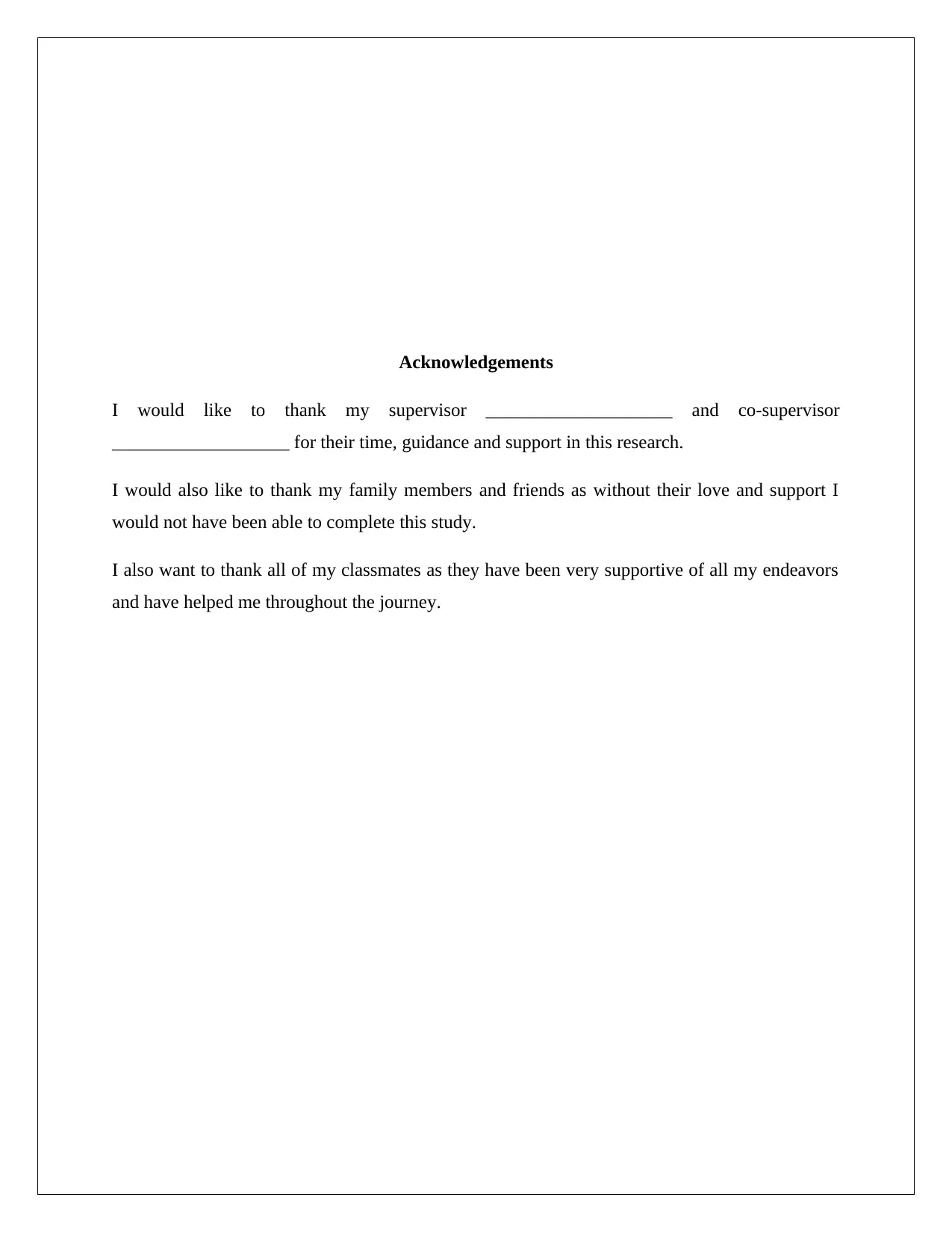
Acknowledgements
I would like to thank my supervisor ____________________ and co-supervisor
___________________ for their time, guidance and support in this research.
I would also like to thank my family members and friends as without their love and support I
would not have been able to complete this study.
I also want to thank all of my classmates as they have been very supportive of all my endeavors
and have helped me throughout the journey.
I would like to thank my supervisor ____________________ and co-supervisor
___________________ for their time, guidance and support in this research.
I would also like to thank my family members and friends as without their love and support I
would not have been able to complete this study.
I also want to thank all of my classmates as they have been very supportive of all my endeavors
and have helped me throughout the journey.
⊘ This is a preview!⊘
Do you want full access?
Subscribe today to unlock all pages.

Trusted by 1+ million students worldwide

Paraphrase This Document
Need a fresh take? Get an instant paraphrase of this document with our AI Paraphraser
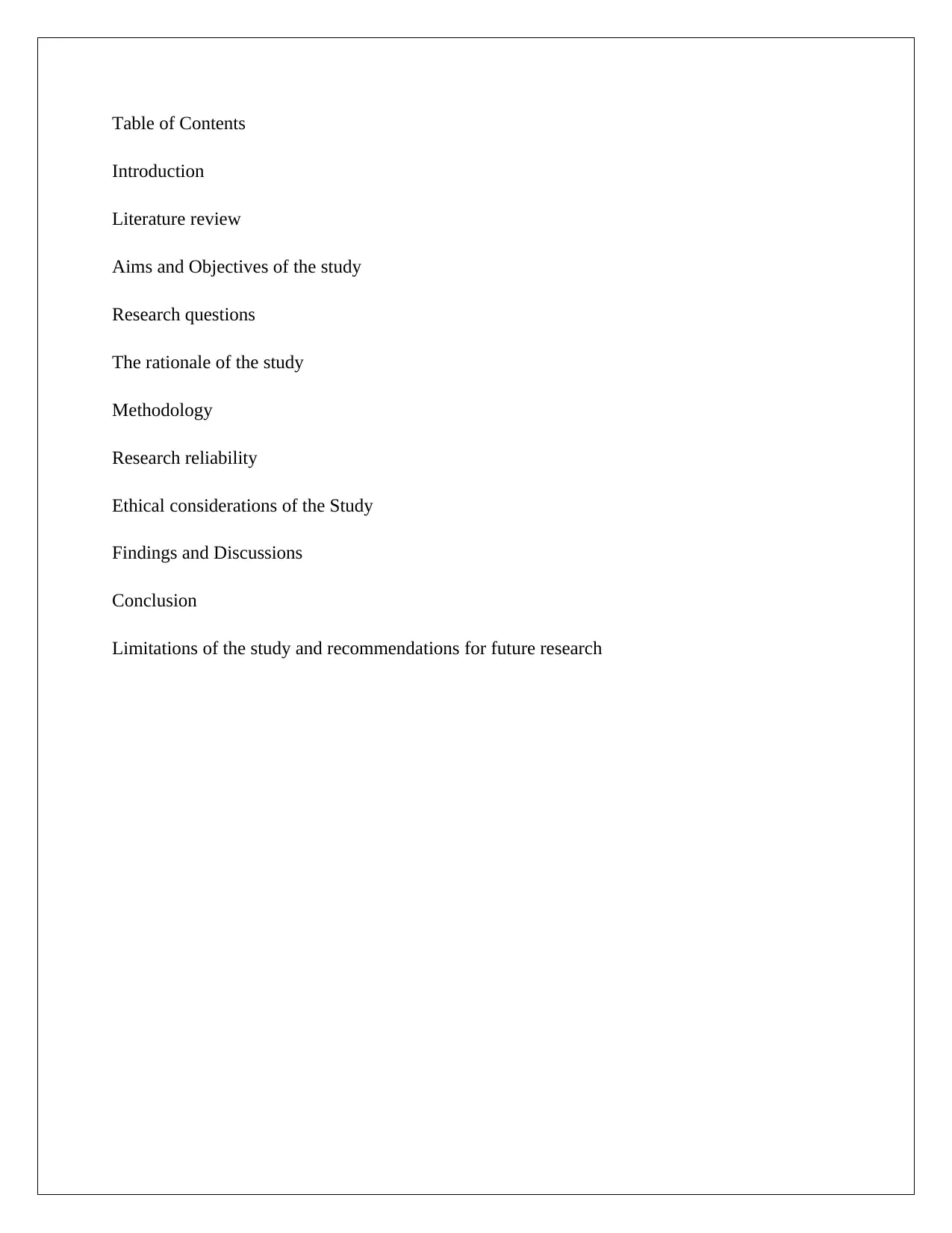
Table of Contents
Introduction
Literature review
Aims and Objectives of the study
Research questions
The rationale of the study
Methodology
Research reliability
Ethical considerations of the Study
Findings and Discussions
Conclusion
Limitations of the study and recommendations for future research
Introduction
Literature review
Aims and Objectives of the study
Research questions
The rationale of the study
Methodology
Research reliability
Ethical considerations of the Study
Findings and Discussions
Conclusion
Limitations of the study and recommendations for future research
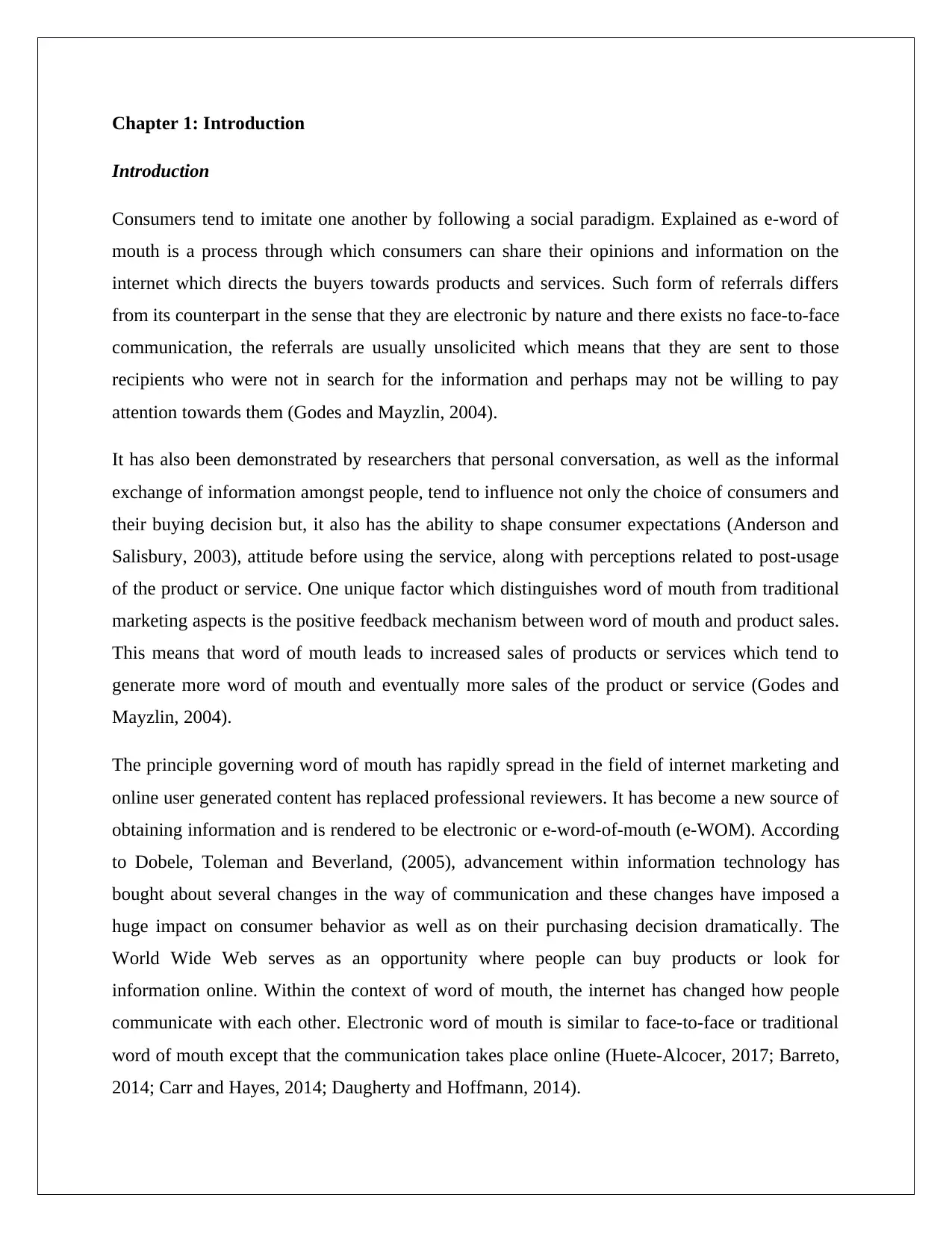
Chapter 1: Introduction
Introduction
Consumers tend to imitate one another by following a social paradigm. Explained as e-word of
mouth is a process through which consumers can share their opinions and information on the
internet which directs the buyers towards products and services. Such form of referrals differs
from its counterpart in the sense that they are electronic by nature and there exists no face-to-face
communication, the referrals are usually unsolicited which means that they are sent to those
recipients who were not in search for the information and perhaps may not be willing to pay
attention towards them (Godes and Mayzlin, 2004).
It has also been demonstrated by researchers that personal conversation, as well as the informal
exchange of information amongst people, tend to influence not only the choice of consumers and
their buying decision but, it also has the ability to shape consumer expectations (Anderson and
Salisbury, 2003), attitude before using the service, along with perceptions related to post-usage
of the product or service. One unique factor which distinguishes word of mouth from traditional
marketing aspects is the positive feedback mechanism between word of mouth and product sales.
This means that word of mouth leads to increased sales of products or services which tend to
generate more word of mouth and eventually more sales of the product or service (Godes and
Mayzlin, 2004).
The principle governing word of mouth has rapidly spread in the field of internet marketing and
online user generated content has replaced professional reviewers. It has become a new source of
obtaining information and is rendered to be electronic or e-word-of-mouth (e-WOM). According
to Dobele, Toleman and Beverland, (2005), advancement within information technology has
bought about several changes in the way of communication and these changes have imposed a
huge impact on consumer behavior as well as on their purchasing decision dramatically. The
World Wide Web serves as an opportunity where people can buy products or look for
information online. Within the context of word of mouth, the internet has changed how people
communicate with each other. Electronic word of mouth is similar to face-to-face or traditional
word of mouth except that the communication takes place online (Huete-Alcocer, 2017; Barreto,
2014; Carr and Hayes, 2014; Daugherty and Hoffmann, 2014).
Introduction
Consumers tend to imitate one another by following a social paradigm. Explained as e-word of
mouth is a process through which consumers can share their opinions and information on the
internet which directs the buyers towards products and services. Such form of referrals differs
from its counterpart in the sense that they are electronic by nature and there exists no face-to-face
communication, the referrals are usually unsolicited which means that they are sent to those
recipients who were not in search for the information and perhaps may not be willing to pay
attention towards them (Godes and Mayzlin, 2004).
It has also been demonstrated by researchers that personal conversation, as well as the informal
exchange of information amongst people, tend to influence not only the choice of consumers and
their buying decision but, it also has the ability to shape consumer expectations (Anderson and
Salisbury, 2003), attitude before using the service, along with perceptions related to post-usage
of the product or service. One unique factor which distinguishes word of mouth from traditional
marketing aspects is the positive feedback mechanism between word of mouth and product sales.
This means that word of mouth leads to increased sales of products or services which tend to
generate more word of mouth and eventually more sales of the product or service (Godes and
Mayzlin, 2004).
The principle governing word of mouth has rapidly spread in the field of internet marketing and
online user generated content has replaced professional reviewers. It has become a new source of
obtaining information and is rendered to be electronic or e-word-of-mouth (e-WOM). According
to Dobele, Toleman and Beverland, (2005), advancement within information technology has
bought about several changes in the way of communication and these changes have imposed a
huge impact on consumer behavior as well as on their purchasing decision dramatically. The
World Wide Web serves as an opportunity where people can buy products or look for
information online. Within the context of word of mouth, the internet has changed how people
communicate with each other. Electronic word of mouth is similar to face-to-face or traditional
word of mouth except that the communication takes place online (Huete-Alcocer, 2017; Barreto,
2014; Carr and Hayes, 2014; Daugherty and Hoffmann, 2014).
⊘ This is a preview!⊘
Do you want full access?
Subscribe today to unlock all pages.

Trusted by 1+ million students worldwide
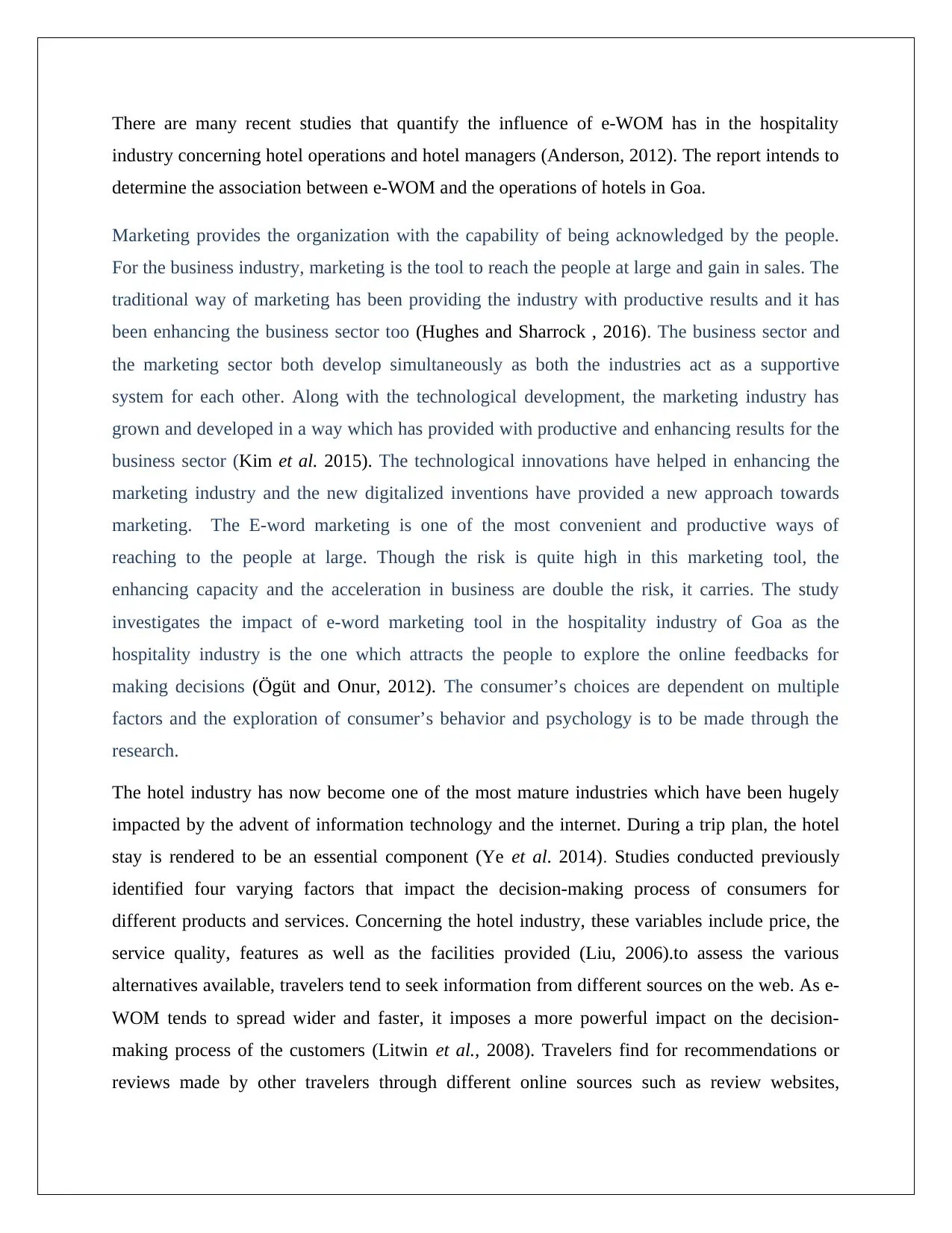
There are many recent studies that quantify the influence of e-WOM has in the hospitality
industry concerning hotel operations and hotel managers (Anderson, 2012). The report intends to
determine the association between e-WOM and the operations of hotels in Goa.
Marketing provides the organization with the capability of being acknowledged by the people.
For the business industry, marketing is the tool to reach the people at large and gain in sales. The
traditional way of marketing has been providing the industry with productive results and it has
been enhancing the business sector too (Hughes and Sharrock , 2016). The business sector and
the marketing sector both develop simultaneously as both the industries act as a supportive
system for each other. Along with the technological development, the marketing industry has
grown and developed in a way which has provided with productive and enhancing results for the
business sector (Kim et al. 2015). The technological innovations have helped in enhancing the
marketing industry and the new digitalized inventions have provided a new approach towards
marketing. The E-word marketing is one of the most convenient and productive ways of
reaching to the people at large. Though the risk is quite high in this marketing tool, the
enhancing capacity and the acceleration in business are double the risk, it carries. The study
investigates the impact of e-word marketing tool in the hospitality industry of Goa as the
hospitality industry is the one which attracts the people to explore the online feedbacks for
making decisions (Ögüt and Onur, 2012). The consumer’s choices are dependent on multiple
factors and the exploration of consumer’s behavior and psychology is to be made through the
research.
The hotel industry has now become one of the most mature industries which have been hugely
impacted by the advent of information technology and the internet. During a trip plan, the hotel
stay is rendered to be an essential component (Ye et al. 2014). Studies conducted previously
identified four varying factors that impact the decision-making process of consumers for
different products and services. Concerning the hotel industry, these variables include price, the
service quality, features as well as the facilities provided (Liu, 2006).to assess the various
alternatives available, travelers tend to seek information from different sources on the web. As e-
WOM tends to spread wider and faster, it imposes a more powerful impact on the decision-
making process of the customers (Litwin et al., 2008). Travelers find for recommendations or
reviews made by other travelers through different online sources such as review websites,
industry concerning hotel operations and hotel managers (Anderson, 2012). The report intends to
determine the association between e-WOM and the operations of hotels in Goa.
Marketing provides the organization with the capability of being acknowledged by the people.
For the business industry, marketing is the tool to reach the people at large and gain in sales. The
traditional way of marketing has been providing the industry with productive results and it has
been enhancing the business sector too (Hughes and Sharrock , 2016). The business sector and
the marketing sector both develop simultaneously as both the industries act as a supportive
system for each other. Along with the technological development, the marketing industry has
grown and developed in a way which has provided with productive and enhancing results for the
business sector (Kim et al. 2015). The technological innovations have helped in enhancing the
marketing industry and the new digitalized inventions have provided a new approach towards
marketing. The E-word marketing is one of the most convenient and productive ways of
reaching to the people at large. Though the risk is quite high in this marketing tool, the
enhancing capacity and the acceleration in business are double the risk, it carries. The study
investigates the impact of e-word marketing tool in the hospitality industry of Goa as the
hospitality industry is the one which attracts the people to explore the online feedbacks for
making decisions (Ögüt and Onur, 2012). The consumer’s choices are dependent on multiple
factors and the exploration of consumer’s behavior and psychology is to be made through the
research.
The hotel industry has now become one of the most mature industries which have been hugely
impacted by the advent of information technology and the internet. During a trip plan, the hotel
stay is rendered to be an essential component (Ye et al. 2014). Studies conducted previously
identified four varying factors that impact the decision-making process of consumers for
different products and services. Concerning the hotel industry, these variables include price, the
service quality, features as well as the facilities provided (Liu, 2006).to assess the various
alternatives available, travelers tend to seek information from different sources on the web. As e-
WOM tends to spread wider and faster, it imposes a more powerful impact on the decision-
making process of the customers (Litwin et al., 2008). Travelers find for recommendations or
reviews made by other travelers through different online sources such as review websites,
Paraphrase This Document
Need a fresh take? Get an instant paraphrase of this document with our AI Paraphraser
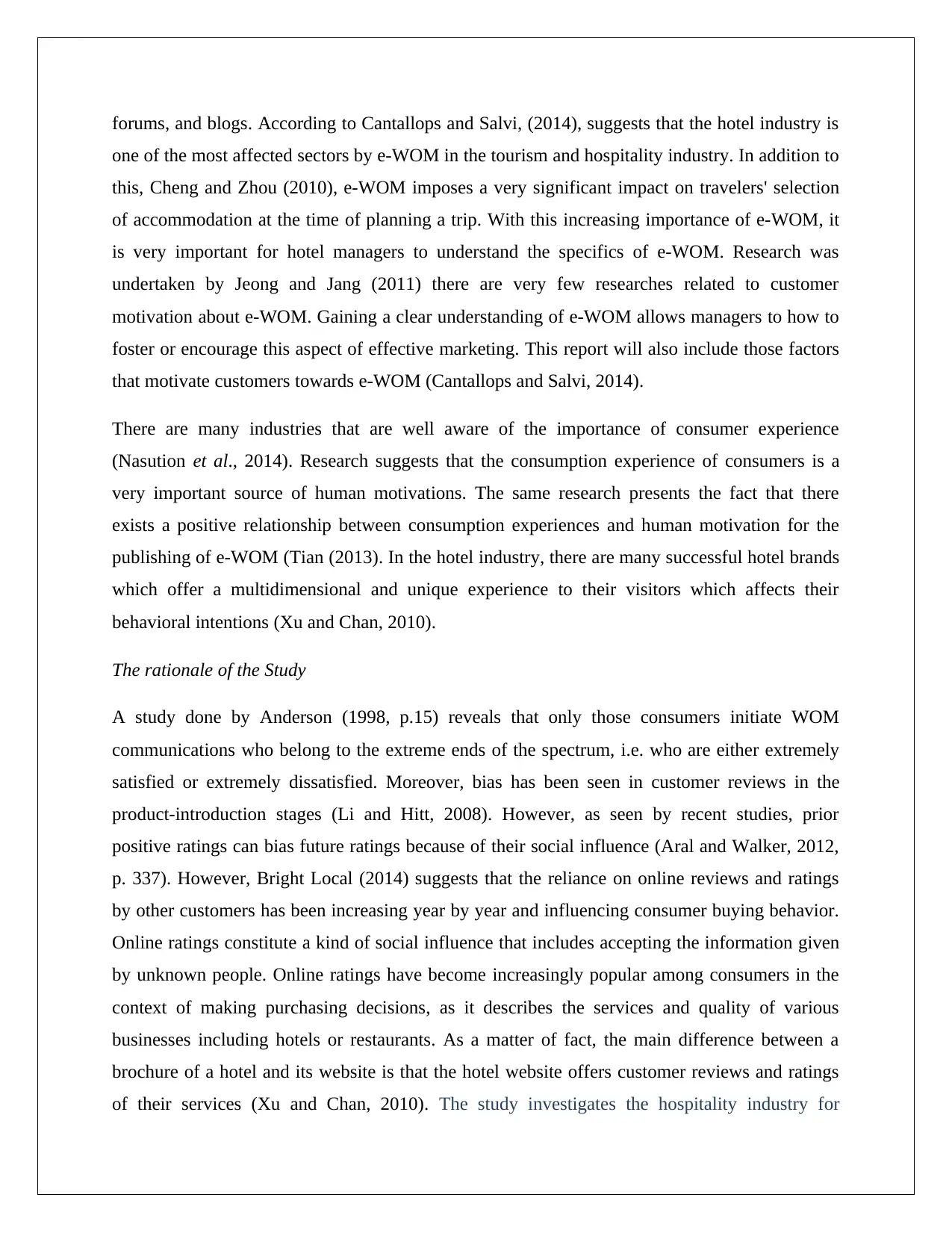
forums, and blogs. According to Cantallops and Salvi, (2014), suggests that the hotel industry is
one of the most affected sectors by e-WOM in the tourism and hospitality industry. In addition to
this, Cheng and Zhou (2010), e-WOM imposes a very significant impact on travelers' selection
of accommodation at the time of planning a trip. With this increasing importance of e-WOM, it
is very important for hotel managers to understand the specifics of e-WOM. Research was
undertaken by Jeong and Jang (2011) there are very few researches related to customer
motivation about e-WOM. Gaining a clear understanding of e-WOM allows managers to how to
foster or encourage this aspect of effective marketing. This report will also include those factors
that motivate customers towards e-WOM (Cantallops and Salvi, 2014).
There are many industries that are well aware of the importance of consumer experience
(Nasution et al., 2014). Research suggests that the consumption experience of consumers is a
very important source of human motivations. The same research presents the fact that there
exists a positive relationship between consumption experiences and human motivation for the
publishing of e-WOM (Tian (2013). In the hotel industry, there are many successful hotel brands
which offer a multidimensional and unique experience to their visitors which affects their
behavioral intentions (Xu and Chan, 2010).
The rationale of the Study
A study done by Anderson (1998, p.15) reveals that only those consumers initiate WOM
communications who belong to the extreme ends of the spectrum, i.e. who are either extremely
satisfied or extremely dissatisfied. Moreover, bias has been seen in customer reviews in the
product-introduction stages (Li and Hitt, 2008). However, as seen by recent studies, prior
positive ratings can bias future ratings because of their social influence (Aral and Walker, 2012,
p. 337). However, Bright Local (2014) suggests that the reliance on online reviews and ratings
by other customers has been increasing year by year and influencing consumer buying behavior.
Online ratings constitute a kind of social influence that includes accepting the information given
by unknown people. Online ratings have become increasingly popular among consumers in the
context of making purchasing decisions, as it describes the services and quality of various
businesses including hotels or restaurants. As a matter of fact, the main difference between a
brochure of a hotel and its website is that the hotel website offers customer reviews and ratings
of their services (Xu and Chan, 2010). The study investigates the hospitality industry for
one of the most affected sectors by e-WOM in the tourism and hospitality industry. In addition to
this, Cheng and Zhou (2010), e-WOM imposes a very significant impact on travelers' selection
of accommodation at the time of planning a trip. With this increasing importance of e-WOM, it
is very important for hotel managers to understand the specifics of e-WOM. Research was
undertaken by Jeong and Jang (2011) there are very few researches related to customer
motivation about e-WOM. Gaining a clear understanding of e-WOM allows managers to how to
foster or encourage this aspect of effective marketing. This report will also include those factors
that motivate customers towards e-WOM (Cantallops and Salvi, 2014).
There are many industries that are well aware of the importance of consumer experience
(Nasution et al., 2014). Research suggests that the consumption experience of consumers is a
very important source of human motivations. The same research presents the fact that there
exists a positive relationship between consumption experiences and human motivation for the
publishing of e-WOM (Tian (2013). In the hotel industry, there are many successful hotel brands
which offer a multidimensional and unique experience to their visitors which affects their
behavioral intentions (Xu and Chan, 2010).
The rationale of the Study
A study done by Anderson (1998, p.15) reveals that only those consumers initiate WOM
communications who belong to the extreme ends of the spectrum, i.e. who are either extremely
satisfied or extremely dissatisfied. Moreover, bias has been seen in customer reviews in the
product-introduction stages (Li and Hitt, 2008). However, as seen by recent studies, prior
positive ratings can bias future ratings because of their social influence (Aral and Walker, 2012,
p. 337). However, Bright Local (2014) suggests that the reliance on online reviews and ratings
by other customers has been increasing year by year and influencing consumer buying behavior.
Online ratings constitute a kind of social influence that includes accepting the information given
by unknown people. Online ratings have become increasingly popular among consumers in the
context of making purchasing decisions, as it describes the services and quality of various
businesses including hotels or restaurants. As a matter of fact, the main difference between a
brochure of a hotel and its website is that the hotel website offers customer reviews and ratings
of their services (Xu and Chan, 2010). The study investigates the hospitality industry for
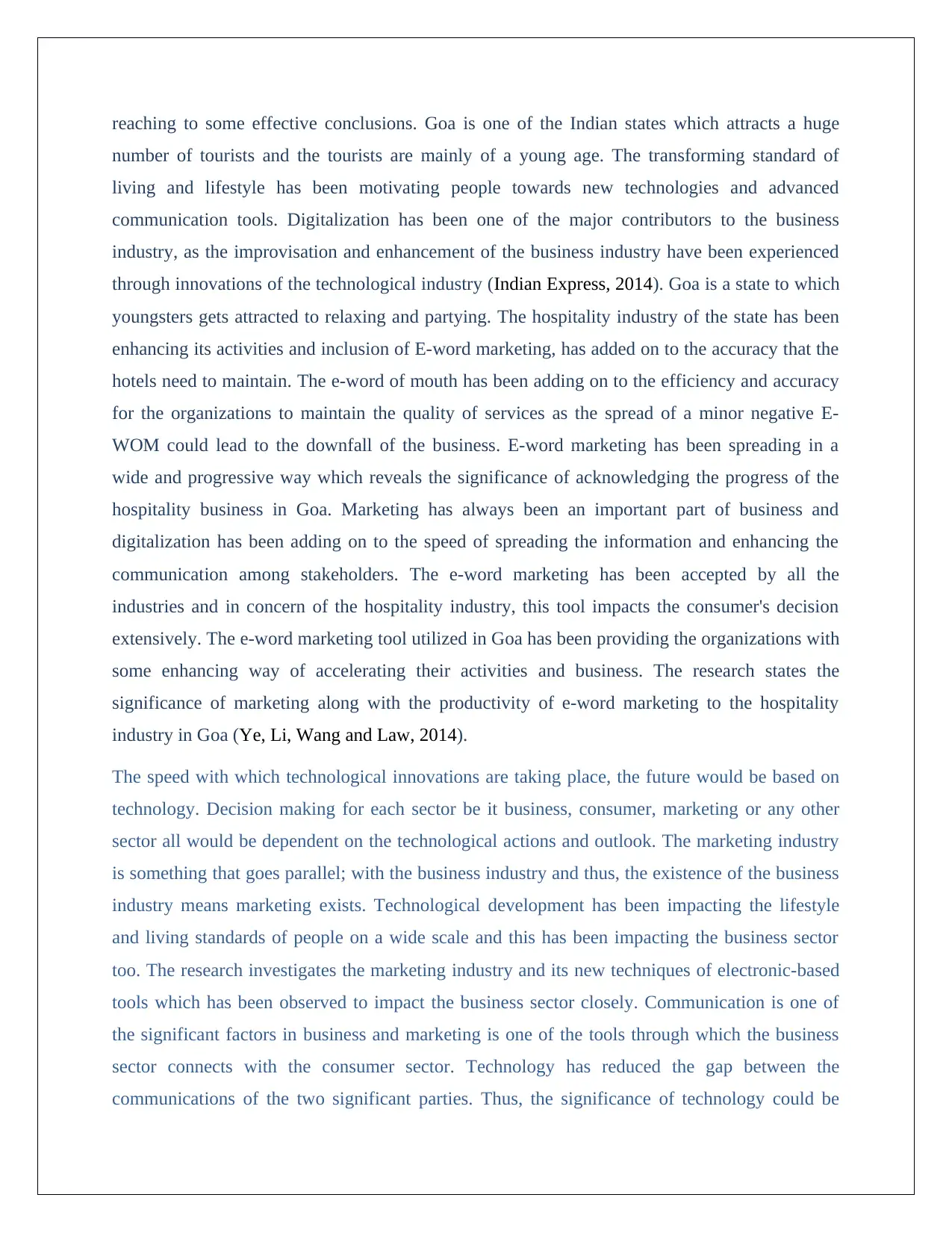
reaching to some effective conclusions. Goa is one of the Indian states which attracts a huge
number of tourists and the tourists are mainly of a young age. The transforming standard of
living and lifestyle has been motivating people towards new technologies and advanced
communication tools. Digitalization has been one of the major contributors to the business
industry, as the improvisation and enhancement of the business industry have been experienced
through innovations of the technological industry (Indian Express, 2014). Goa is a state to which
youngsters gets attracted to relaxing and partying. The hospitality industry of the state has been
enhancing its activities and inclusion of E-word marketing, has added on to the accuracy that the
hotels need to maintain. The e-word of mouth has been adding on to the efficiency and accuracy
for the organizations to maintain the quality of services as the spread of a minor negative E-
WOM could lead to the downfall of the business. E-word marketing has been spreading in a
wide and progressive way which reveals the significance of acknowledging the progress of the
hospitality business in Goa. Marketing has always been an important part of business and
digitalization has been adding on to the speed of spreading the information and enhancing the
communication among stakeholders. The e-word marketing has been accepted by all the
industries and in concern of the hospitality industry, this tool impacts the consumer's decision
extensively. The e-word marketing tool utilized in Goa has been providing the organizations with
some enhancing way of accelerating their activities and business. The research states the
significance of marketing along with the productivity of e-word marketing to the hospitality
industry in Goa (Ye, Li, Wang and Law, 2014).
The speed with which technological innovations are taking place, the future would be based on
technology. Decision making for each sector be it business, consumer, marketing or any other
sector all would be dependent on the technological actions and outlook. The marketing industry
is something that goes parallel; with the business industry and thus, the existence of the business
industry means marketing exists. Technological development has been impacting the lifestyle
and living standards of people on a wide scale and this has been impacting the business sector
too. The research investigates the marketing industry and its new techniques of electronic-based
tools which has been observed to impact the business sector closely. Communication is one of
the significant factors in business and marketing is one of the tools through which the business
sector connects with the consumer sector. Technology has reduced the gap between the
communications of the two significant parties. Thus, the significance of technology could be
number of tourists and the tourists are mainly of a young age. The transforming standard of
living and lifestyle has been motivating people towards new technologies and advanced
communication tools. Digitalization has been one of the major contributors to the business
industry, as the improvisation and enhancement of the business industry have been experienced
through innovations of the technological industry (Indian Express, 2014). Goa is a state to which
youngsters gets attracted to relaxing and partying. The hospitality industry of the state has been
enhancing its activities and inclusion of E-word marketing, has added on to the accuracy that the
hotels need to maintain. The e-word of mouth has been adding on to the efficiency and accuracy
for the organizations to maintain the quality of services as the spread of a minor negative E-
WOM could lead to the downfall of the business. E-word marketing has been spreading in a
wide and progressive way which reveals the significance of acknowledging the progress of the
hospitality business in Goa. Marketing has always been an important part of business and
digitalization has been adding on to the speed of spreading the information and enhancing the
communication among stakeholders. The e-word marketing has been accepted by all the
industries and in concern of the hospitality industry, this tool impacts the consumer's decision
extensively. The e-word marketing tool utilized in Goa has been providing the organizations with
some enhancing way of accelerating their activities and business. The research states the
significance of marketing along with the productivity of e-word marketing to the hospitality
industry in Goa (Ye, Li, Wang and Law, 2014).
The speed with which technological innovations are taking place, the future would be based on
technology. Decision making for each sector be it business, consumer, marketing or any other
sector all would be dependent on the technological actions and outlook. The marketing industry
is something that goes parallel; with the business industry and thus, the existence of the business
industry means marketing exists. Technological development has been impacting the lifestyle
and living standards of people on a wide scale and this has been impacting the business sector
too. The research investigates the marketing industry and its new techniques of electronic-based
tools which has been observed to impact the business sector closely. Communication is one of
the significant factors in business and marketing is one of the tools through which the business
sector connects with the consumer sector. Technology has reduced the gap between the
communications of the two significant parties. Thus, the significance of technology could be
⊘ This is a preview!⊘
Do you want full access?
Subscribe today to unlock all pages.

Trusted by 1+ million students worldwide
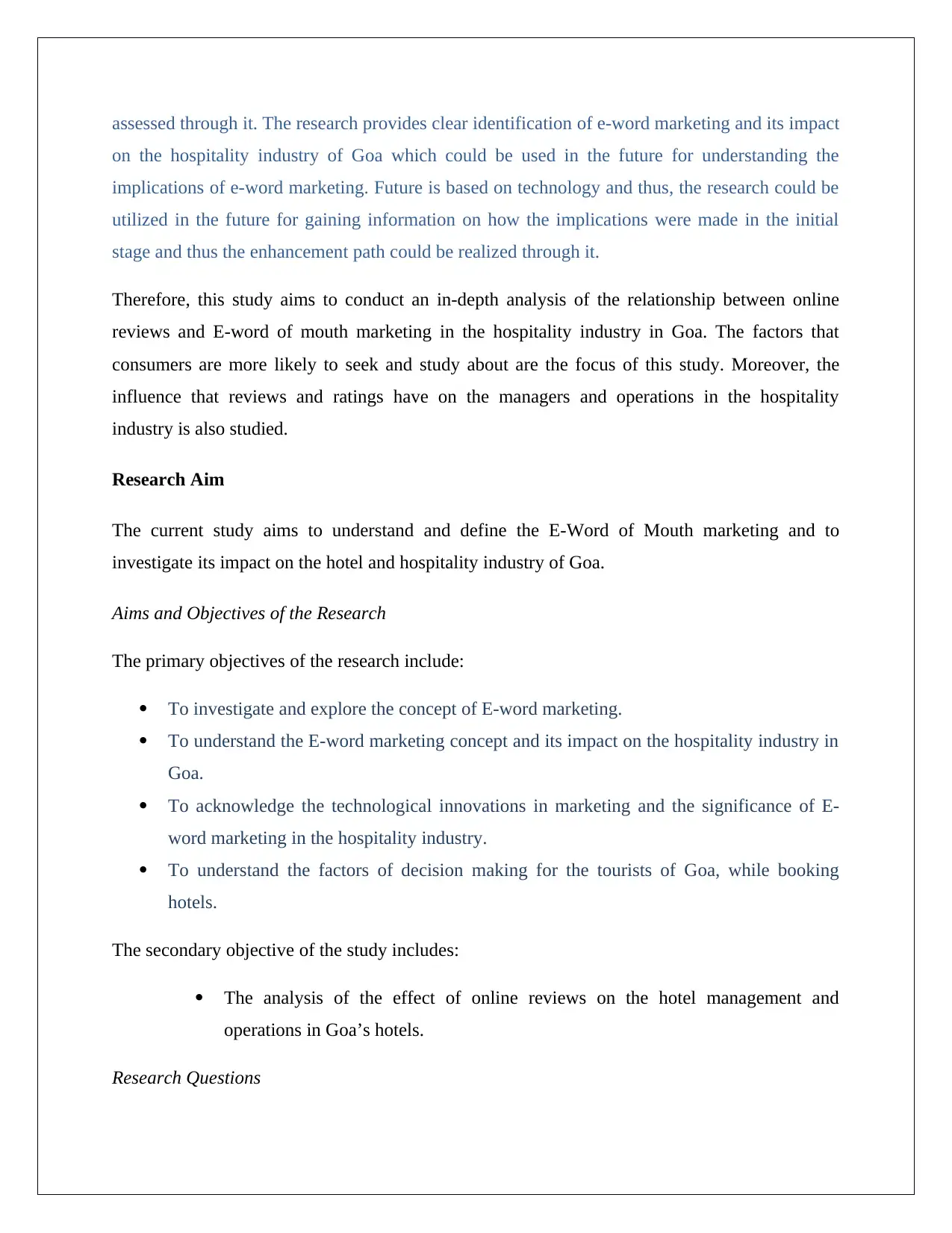
assessed through it. The research provides clear identification of e-word marketing and its impact
on the hospitality industry of Goa which could be used in the future for understanding the
implications of e-word marketing. Future is based on technology and thus, the research could be
utilized in the future for gaining information on how the implications were made in the initial
stage and thus the enhancement path could be realized through it.
Therefore, this study aims to conduct an in-depth analysis of the relationship between online
reviews and E-word of mouth marketing in the hospitality industry in Goa. The factors that
consumers are more likely to seek and study about are the focus of this study. Moreover, the
influence that reviews and ratings have on the managers and operations in the hospitality
industry is also studied.
Research Aim
The current study aims to understand and define the E-Word of Mouth marketing and to
investigate its impact on the hotel and hospitality industry of Goa.
Aims and Objectives of the Research
The primary objectives of the research include:
To investigate and explore the concept of E-word marketing.
To understand the E-word marketing concept and its impact on the hospitality industry in
Goa.
To acknowledge the technological innovations in marketing and the significance of E-
word marketing in the hospitality industry.
To understand the factors of decision making for the tourists of Goa, while booking
hotels.
The secondary objective of the study includes:
The analysis of the effect of online reviews on the hotel management and
operations in Goa’s hotels.
Research Questions
on the hospitality industry of Goa which could be used in the future for understanding the
implications of e-word marketing. Future is based on technology and thus, the research could be
utilized in the future for gaining information on how the implications were made in the initial
stage and thus the enhancement path could be realized through it.
Therefore, this study aims to conduct an in-depth analysis of the relationship between online
reviews and E-word of mouth marketing in the hospitality industry in Goa. The factors that
consumers are more likely to seek and study about are the focus of this study. Moreover, the
influence that reviews and ratings have on the managers and operations in the hospitality
industry is also studied.
Research Aim
The current study aims to understand and define the E-Word of Mouth marketing and to
investigate its impact on the hotel and hospitality industry of Goa.
Aims and Objectives of the Research
The primary objectives of the research include:
To investigate and explore the concept of E-word marketing.
To understand the E-word marketing concept and its impact on the hospitality industry in
Goa.
To acknowledge the technological innovations in marketing and the significance of E-
word marketing in the hospitality industry.
To understand the factors of decision making for the tourists of Goa, while booking
hotels.
The secondary objective of the study includes:
The analysis of the effect of online reviews on the hotel management and
operations in Goa’s hotels.
Research Questions
Paraphrase This Document
Need a fresh take? Get an instant paraphrase of this document with our AI Paraphraser
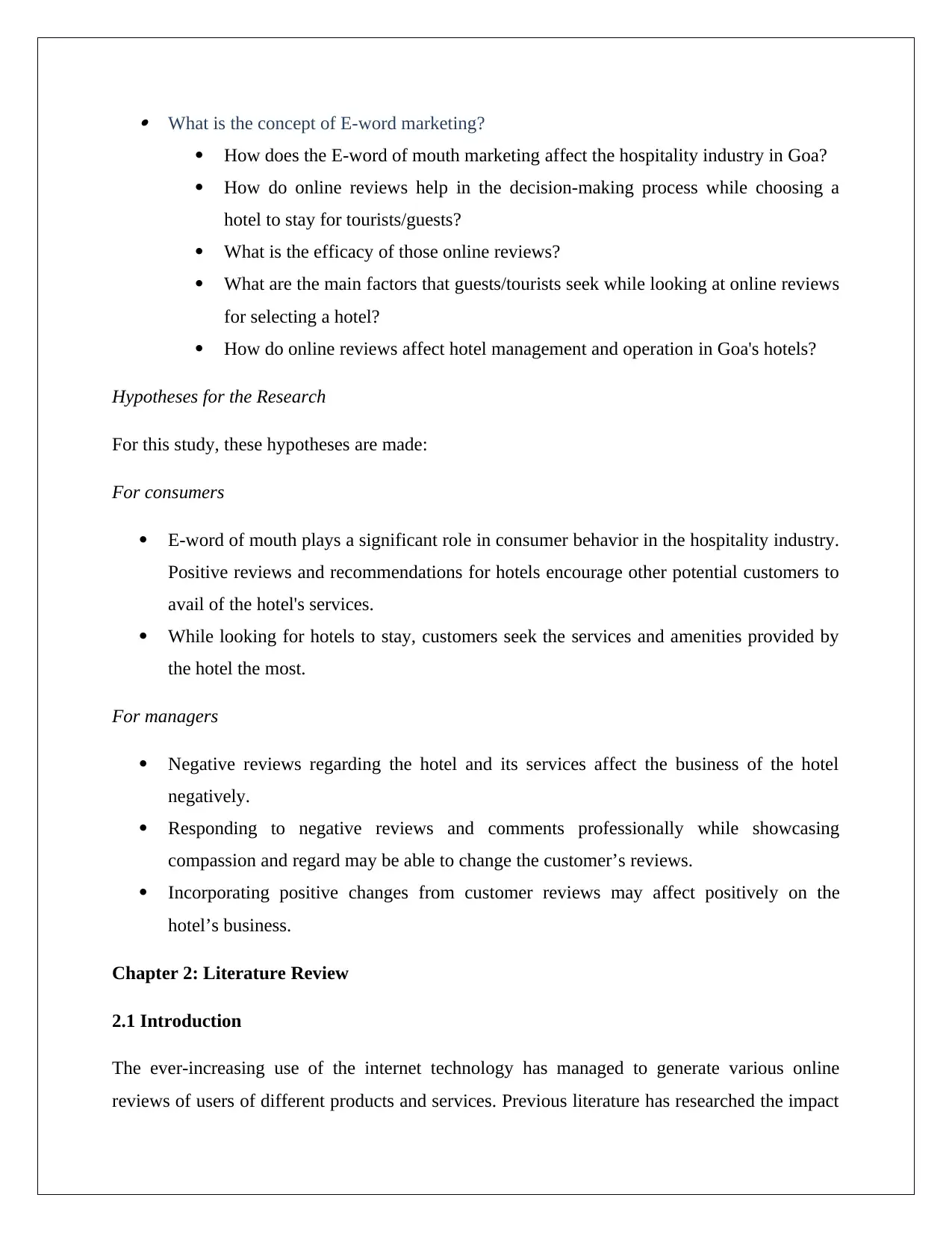
What is the concept of E-word marketing?
How does the E-word of mouth marketing affect the hospitality industry in Goa?
How do online reviews help in the decision-making process while choosing a
hotel to stay for tourists/guests?
What is the efficacy of those online reviews?
What are the main factors that guests/tourists seek while looking at online reviews
for selecting a hotel?
How do online reviews affect hotel management and operation in Goa's hotels?
Hypotheses for the Research
For this study, these hypotheses are made:
For consumers
E-word of mouth plays a significant role in consumer behavior in the hospitality industry.
Positive reviews and recommendations for hotels encourage other potential customers to
avail of the hotel's services.
While looking for hotels to stay, customers seek the services and amenities provided by
the hotel the most.
For managers
Negative reviews regarding the hotel and its services affect the business of the hotel
negatively.
Responding to negative reviews and comments professionally while showcasing
compassion and regard may be able to change the customer’s reviews.
Incorporating positive changes from customer reviews may affect positively on the
hotel’s business.
Chapter 2: Literature Review
2.1 Introduction
The ever-increasing use of the internet technology has managed to generate various online
reviews of users of different products and services. Previous literature has researched the impact
How does the E-word of mouth marketing affect the hospitality industry in Goa?
How do online reviews help in the decision-making process while choosing a
hotel to stay for tourists/guests?
What is the efficacy of those online reviews?
What are the main factors that guests/tourists seek while looking at online reviews
for selecting a hotel?
How do online reviews affect hotel management and operation in Goa's hotels?
Hypotheses for the Research
For this study, these hypotheses are made:
For consumers
E-word of mouth plays a significant role in consumer behavior in the hospitality industry.
Positive reviews and recommendations for hotels encourage other potential customers to
avail of the hotel's services.
While looking for hotels to stay, customers seek the services and amenities provided by
the hotel the most.
For managers
Negative reviews regarding the hotel and its services affect the business of the hotel
negatively.
Responding to negative reviews and comments professionally while showcasing
compassion and regard may be able to change the customer’s reviews.
Incorporating positive changes from customer reviews may affect positively on the
hotel’s business.
Chapter 2: Literature Review
2.1 Introduction
The ever-increasing use of the internet technology has managed to generate various online
reviews of users of different products and services. Previous literature has researched the impact
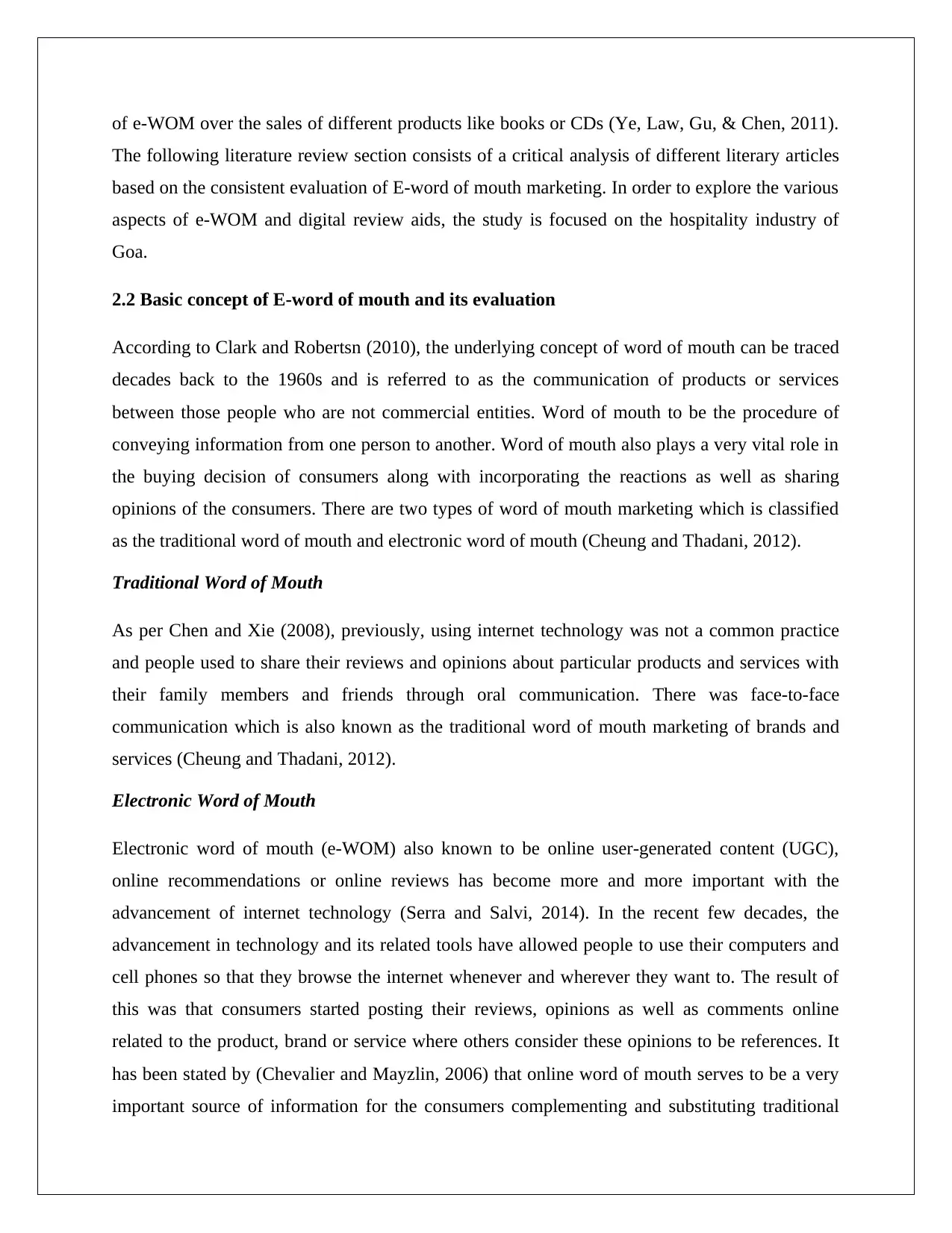
of e-WOM over the sales of different products like books or CDs (Ye, Law, Gu, & Chen, 2011).
The following literature review section consists of a critical analysis of different literary articles
based on the consistent evaluation of E-word of mouth marketing. In order to explore the various
aspects of e-WOM and digital review aids, the study is focused on the hospitality industry of
Goa.
2.2 Basic concept of E-word of mouth and its evaluation
According to Clark and Robertsn (2010), the underlying concept of word of mouth can be traced
decades back to the 1960s and is referred to as the communication of products or services
between those people who are not commercial entities. Word of mouth to be the procedure of
conveying information from one person to another. Word of mouth also plays a very vital role in
the buying decision of consumers along with incorporating the reactions as well as sharing
opinions of the consumers. There are two types of word of mouth marketing which is classified
as the traditional word of mouth and electronic word of mouth (Cheung and Thadani, 2012).
Traditional Word of Mouth
As per Chen and Xie (2008), previously, using internet technology was not a common practice
and people used to share their reviews and opinions about particular products and services with
their family members and friends through oral communication. There was face-to-face
communication which is also known as the traditional word of mouth marketing of brands and
services (Cheung and Thadani, 2012).
Electronic Word of Mouth
Electronic word of mouth (e-WOM) also known to be online user-generated content (UGC),
online recommendations or online reviews has become more and more important with the
advancement of internet technology (Serra and Salvi, 2014). In the recent few decades, the
advancement in technology and its related tools have allowed people to use their computers and
cell phones so that they browse the internet whenever and wherever they want to. The result of
this was that consumers started posting their reviews, opinions as well as comments online
related to the product, brand or service where others consider these opinions to be references. It
has been stated by (Chevalier and Mayzlin, 2006) that online word of mouth serves to be a very
important source of information for the consumers complementing and substituting traditional
The following literature review section consists of a critical analysis of different literary articles
based on the consistent evaluation of E-word of mouth marketing. In order to explore the various
aspects of e-WOM and digital review aids, the study is focused on the hospitality industry of
Goa.
2.2 Basic concept of E-word of mouth and its evaluation
According to Clark and Robertsn (2010), the underlying concept of word of mouth can be traced
decades back to the 1960s and is referred to as the communication of products or services
between those people who are not commercial entities. Word of mouth to be the procedure of
conveying information from one person to another. Word of mouth also plays a very vital role in
the buying decision of consumers along with incorporating the reactions as well as sharing
opinions of the consumers. There are two types of word of mouth marketing which is classified
as the traditional word of mouth and electronic word of mouth (Cheung and Thadani, 2012).
Traditional Word of Mouth
As per Chen and Xie (2008), previously, using internet technology was not a common practice
and people used to share their reviews and opinions about particular products and services with
their family members and friends through oral communication. There was face-to-face
communication which is also known as the traditional word of mouth marketing of brands and
services (Cheung and Thadani, 2012).
Electronic Word of Mouth
Electronic word of mouth (e-WOM) also known to be online user-generated content (UGC),
online recommendations or online reviews has become more and more important with the
advancement of internet technology (Serra and Salvi, 2014). In the recent few decades, the
advancement in technology and its related tools have allowed people to use their computers and
cell phones so that they browse the internet whenever and wherever they want to. The result of
this was that consumers started posting their reviews, opinions as well as comments online
related to the product, brand or service where others consider these opinions to be references. It
has been stated by (Chevalier and Mayzlin, 2006) that online word of mouth serves to be a very
important source of information for the consumers complementing and substituting traditional
⊘ This is a preview!⊘
Do you want full access?
Subscribe today to unlock all pages.

Trusted by 1+ million students worldwide
1 out of 63
Related Documents
Your All-in-One AI-Powered Toolkit for Academic Success.
+13062052269
info@desklib.com
Available 24*7 on WhatsApp / Email
![[object Object]](/_next/static/media/star-bottom.7253800d.svg)
Unlock your academic potential
Copyright © 2020–2026 A2Z Services. All Rights Reserved. Developed and managed by ZUCOL.





